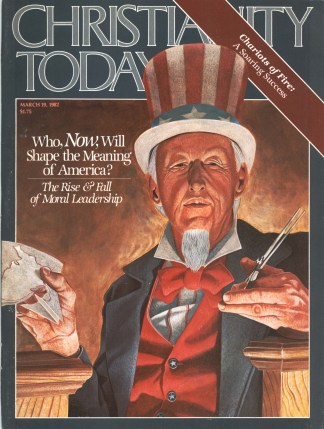Whether or not America was ever in any legitimate sense a Christian nation is open to debate. In its early years, it was certainly dominated intellectually by evangelical Puritanism. Somewhere around the turn of the century, a changing of the guards took place in the once-evangelical mainline denominations. New, liberal leadership gave the nation its social, moral, and political direction.
In recent decades, leadership has drifted more and more to the left, fading into the naturalistic humanism that now dominates the campuses of our great universities. But the liberal establishment has fallen short on two counts: (1) It has not been able to provide the dynamism of a compelling religion; and, (2) It has not been able to sustain a view of man and nature to serve as a consistent basis for its social, moral, and political programs. As a result, liberal leadership is in deep trouble. It falters at every step, and the torch of leadership is slipping from its unsteady hand.
In this moment of crisis, who will seize the torch and provide the necessary leadership for our nation? The fundamentalists? The evangelicals? The Roman Catholics? Or will it be some coalition not yet identifiable in the current scene? In this issue, Richard Neuhaus probes the crisis in leadership for church and nation and calls for the reconstruction of a public philosophy that will incorporate those transcendent values that alone can provide dignity and meaning to mankind and to this earthly scene.
Evangelicals are appalled at the adverse publicity given biblical faith by the public media as a result of the recent creation/evolution trial in Arkansas. The turn of events left evangelicals of all stamps—from far Right to far Left—puzzled and divided. Convinced evangelicals testified on both sides at the trial, and who stood for what became thoroughly muddled. In an initial move to sort out the issues, we are publishing the statements of two evangelical leaders—one from each side.
For your enjoyment and irritation, we also introduce you to Eutychus XI. According to ancient tradition, the author of this highly read column must remain anonymous. But part of the fun, of course, is trying to guess who among the eminent evangelicals of our time would write such outrageous things. We trust the new Eutychus will also probe deeply enough to uncover unsuspected ulcers to which we can then apply the healing medicine.
A generation ago, G. Campbell Morgan held forth as one of the greatest pulpiteers and expounders of Holy Scripture to be found on either side of the Atlantic. He was also a stalwart defender of the Bible and its authority. His grandson, Richard Lyon Morgan, tells how he found life and faith through that same Book, and demonstrates once again that although a godly heritage is a great blessing, Christianity is not inherited. Every man’s faith must be worked out personally.
Finally, Calvin Miller, widely known for his narrative poem, The Singer, has given us a searching piece that you will not wish to miss.










